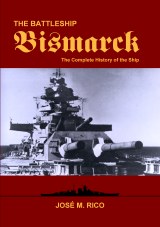 |
| Home Intro Technical History Crew Models Gallery Kriegsmarine Archives More Forum Español UPDATES |
Report of the Commander in Chief, Navy, to the Führer on 9 March 1940 at 1200.
Present: Generaloberst Keitel
Operation "Weserübung".
1. The Commander in Chief, Navy, states that he has always been, and still is today, of the opinion that the occupation of Norway by the British could have a decisive effect against Germany, since then Sweden might also be drawn into the war against Germany and all the ore supplies from Sweden would cease. The British now have the desired opportunity, under pretext of supporting the Finns, to send troop transports through Norway and Sweden and therefore to occupy these countries if they wish. Therefore operation "Weserübung" is urgent. The Commander in Chief, Navy, feels it his duty, however, to present to the Führer a clear picture regarding the character of the naval operation. The operation in itself is contrary to all principles in the theory of naval warfare. According to this theory, it could be carried out by us only if we had naval supremacy. We do not have this; on the contrary, we are carrying out the operation in face of the vastly superior British Fleet. In spite of this the Commander in Chief, Navy, believes that, provided surprise is complete, our troops can and will successfully be transported to Norway. On many occasions in the history of war those very operations have been successful which went against all the principles of warfare, provided they were carried out by surprise. The critical moment is the penetration of the harbors while passing the coastal fortifications. It is to be expected that this will succeed if carried out by surprise, and that the Norwegians will not make the decision to fire quickly enough, if they decide to do so at all.
The most difficult operation for the ships is the return voyage, which entails breaking through the British naval forces. The main British force has lately been stationed in Scapa Flow again; at present there are two battle cruisers, three battleships, and at least three or four heavy cruisers there. Light naval units will shadow our forces and attempt to direct the main British force to them. All modern naval forces must combine for this break-through, i.e., battleships, the HIPPER, and all destroyers from Narvik and Trondheim. The forces at and south of Bergen (small cruisers and special service ships) must break through along the coast with the support of the LÜTZOW. Not one destroyer may be left behind, let alone a cruiser (the HIPPER) either in Narvik or in Trondheim, at a time when the fate of the German Fleet is hanging in the balance. Strongest cooperation on the part of the Luftwaffe is necessary. Four large submarines will be stationed in Narvik and two probably in the other bases; a number will be disposed along the advance routes of the British Fleet.
In the period immediately following occupation, escort of transports to Oslo will be of primary importance, as well as the establishment of safe bases for naval forces in the harbors on the southwest and west coasts. Subsequently operations can be carried out from these. The transport of ore from Narvik will be interrupted until further notice because the problem of whether and in what manner the extensive coastal waters can be defended against British attacks must be clarified first.
2. The Commander in Chief, Navy, suggests that the Russians be informed following the occupation, that Tromsø has not been occupied by the Germans. This could be interpreted by the Russians constituting some consideration for their interests. It is better to have the Russians in Tromsø than the British. The Führer does not wish to have the Russians so near, and is of the opinion that Tromsø will also have to be occupied by us.
3. The Commander in Chief, Navy, requests permission for the Naval Air Force to lay about six aerial mines in Scapa Flow, in order to inflict damage on the British capital ships, which might subsequently withdraw to the Faroes.
The Führer gives his full consent, and considers an agreement with the Luftwaffe necessary, since the latter is planning bombing attacks soon.
4. The Commander in Chief, Navy, gives a survey on the execution of the naval operation by the various groups.

| Home Guestbook Quiz Glossary Help us Weights & Measures Video Credits Links Contact |
